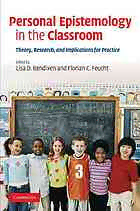
Personal epistemology in the classroom : theory, research, and implications for practice PDF
Preview Personal epistemology in the classroom : theory, research, and implications for practice
This page intentionally left blank Personal Epistemology in the Classroom Personal epistemology is the study of beliefs associated with know ledge and knowing. A large body of theory and research in personal epistemology has been dedicated to college students, but rarely have the epistemic beliefs of children, adolescents, and their teachers been thoroughly examined. This book incorporates both theoretical and empirical work pertaining to personal epistemology as it specifically relates to learning and instruction. Bringing together leading research on preschool through high school students’ personal epistemology, it reexamines existing conceptual frameworks, introduces new models, provides an empirical foundation for learning and instruction, and considers broader educational implications. In addition, the contribu tors stress how personal epistemology issues in the classroom need to be more carefully investigated and understood. lisa d. bendixen is an Associate Professor in the Department of Educational Psychology at the University of Nevada, Las Vegas. florian c. feucht is an Assistant Professor in Educational Psych ology in the Department of Educational Foundations and Leadership in the Judith Herb College of Education, University of Toledo, Ohio. Personal Epistemology in the Classroom: Theory, Research, and Implications for Practice Lisa D. Bendixen and Florian C. Feucht CAMBRIDGE UNIVERSITY PRESS Cambridge, New York, Melbourne, Madrid, Cape Town, Singapore, São Paulo, Delhi, Dubai, Tokyo Cambridge University Press The Edinburgh Building, Cambridge CB2 8RU, UK Published in the United States of America by Cambridge University Press, New York www.cambridge.org Information on this title: www.cambridge.org/9780521883559 © Cambridge University Press 2010 This publication is in copyright. Subject to statutory exception and to the provision of relevant collective licensing agreements, no reproduction of any part may take place without the written permission of Cambridge University Press. First published in print format 2010 ISBN-13 978-0-511-69148-5 eBook (NetLibrary) ISBN-13 978-0-521-88355-9 Hardback Cambridge University Press has no responsibility for the persistence or accuracy of urls for external or third-party internet websites referred to in this publication, and does not guarantee that any content on such websites is, or will remain, accurate or appropriate. We would like to dedicate this book to our grandmothers, Maribel S. Page (sitting at her oneroom school house desk) and Elisabeth Feucht (with a goody basket on her first day of elementary school), for their loving support of us, especially in our educational pursuits. Contents List of figures page x List of tables xii Contributors xiv Part I Introduction 1 1 Personal epistemology in the classroom: a welcome and guide for the reader 3 florian c. feucht and lisa d. bendixen Part II Frameworks and conceptual issues 29 2 Manifestations of an epistemological belief system in preschool to grade twelve classrooms 31 marlene schommer-aikins, mary bird, and linda bakken 3 Epistemic climate in elementary classrooms 55 florian c. feucht 4 The integrative model of personal epistemology development: theoretical underpinnings and implications for education 94 deanna c. rule and lisa d. bendixen 5 An epistemic framework for scientific reasoning in informal contexts 124 fang-ying yang and chin-chung tsai 6 Who knows what and who can we believe? Epistemological beliefs are beliefs about knowledge (mostly) to be attained from others 163 rainer bromme, dorothe kienhues, and torsten porsch vii viii Contents Part III Students’ personal epistemology, its development, and its relation to learning 195 7 Stalking young persons’ changing beliefs about belief 197 michael j. chandler and travis proulx 8 Epistemological development in very young knowers 220 leah k. wildenger, barbara k. hofer, and jean e. burr 9 Beliefs about knowledge and revision of knowledge: on the importance of epistemic beliefs for intentional conceptual change in elementary and middle school students 258 lucia mason 10 The reflexive relation between students’ mathematicsrelated beliefs and the mathematics classroom culture 292 erik de corte, peter op ’t eynde, fien depaepe, and lieven verschaffel 11 Examining the influence of epistemic beliefs and goal orientations on the academic performance of adolescent students enrolled in highpoverty, highminority schools 328 p. karen murphy, michelle m. buehl, jill a. zeruth, maeghan n. edwards, joyce f. long, and shinichi monoi 12 Using cognitive interviewing to explore elementary and secondary school students’ epistemic and ontological cognition 368 jeffrey a. greene, judith torney-purta, roger azevedo, and jane robertson Part IV Teachers’ personal epistemology and its impact on classroom teaching 407 13 Epistemological resources and framing: a cognitive framework for helping teachers interpret and respond to their students’ epistemologies 409 andrew elby and david hammer 14 The effects of teachers’ beliefs on elementary students’ beliefs, motivation, and achievement in mathematics 435 krista r. muis and michael j. foy 15 Teachers’ articulation of beliefs about teaching knowledge: conceptualizing a belief framework 470 helenrose fives and michelle m. buehl
